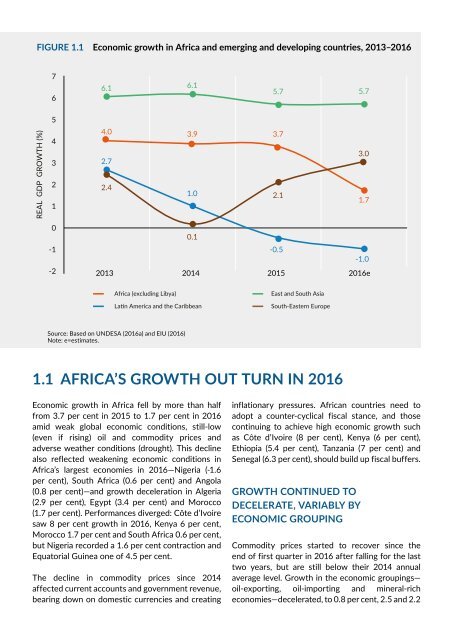URBANIZATION AND INDUSTRIALIZATION
Economic%20Report%20on%20Africa%202017%20UNECA
Economic%20Report%20on%20Africa%202017%20UNECA
Create successful ePaper yourself
Turn your PDF publications into a flip-book with our unique Google optimized e-Paper software.
Figure 1.1 Economic growth in Africa and emerging and developing countries, 2013–2016<br />
7<br />
6<br />
6.1 6.1<br />
5.7 5.7<br />
5<br />
REAL GDP GROWTH (%)<br />
4<br />
3<br />
2<br />
1<br />
4.0 3.9 3.7<br />
2.7<br />
2.4<br />
1.0<br />
2.1<br />
3.0<br />
1.7<br />
0<br />
-1<br />
-2<br />
0.1<br />
-0.5<br />
-1.0<br />
2013 2014 2015 2016e<br />
Africa (excluding Libya)<br />
Latin America and the Caribbean<br />
East and South Asia<br />
South-Eastern Europe<br />
Source: Based on UNDESA (2016a) and EIU (2016)<br />
Note: e=estimates.<br />
1.1 AFRICA’S GROWTH OUT TURN IN 2016<br />
Economic growth in Africa fell by more than half<br />
from 3.7 per cent in 2015 to 1.7 per cent in 2016<br />
amid weak global economic conditions, still-low<br />
(even if rising) oil and commodity prices and<br />
adverse weather conditions (drought). This decline<br />
also reflected weakening economic conditions in<br />
Africa’s largest economies in 2016—Nigeria (-1.6<br />
per cent), South Africa (0.6 per cent) and Angola<br />
(0.8 per cent)—and growth deceleration in Algeria<br />
(2.9 per cent), Egypt (3.4 per cent) and Morocco<br />
(1.7 per cent). Performances diverged: Côte d’Ivoire<br />
saw 8 per cent growth in 2016, Kenya 6 per cent,<br />
Morocco 1.7 per cent and South Africa 0.6 per cent,<br />
but Nigeria recorded a 1.6 per cent contraction and<br />
Equatorial Guinea one of 4.5 per cent.<br />
The decline in commodity prices since 2014<br />
affected current accounts and government revenue,<br />
bearing down on domestic currencies and creating<br />
inflationary pressures. African countries need to<br />
adopt a counter-cyclical fiscal stance, and those<br />
continuing to achieve high economic growth such<br />
as Côte d’Ivoire (8 per cent), Kenya (6 per cent),<br />
Ethiopia (5.4 per cent), Tanzania (7 per cent) and<br />
Senegal (6.3 per cent), should build up fiscal buffers.<br />
GROWTH CONTINUED TO<br />
DECELERATE, VARIABLY BY<br />
ECONOMIC GROUPING<br />
Commodity prices started to recover since the<br />
end of first quarter in 2016 after falling for the last<br />
two years, but are still below their 2014 annual<br />
average level. Growth in the economic groupings—<br />
oil-exporting, oil-importing and mineral-rich<br />
economies—decelerated, to 0.8 per cent, 2.5 and 2.2


